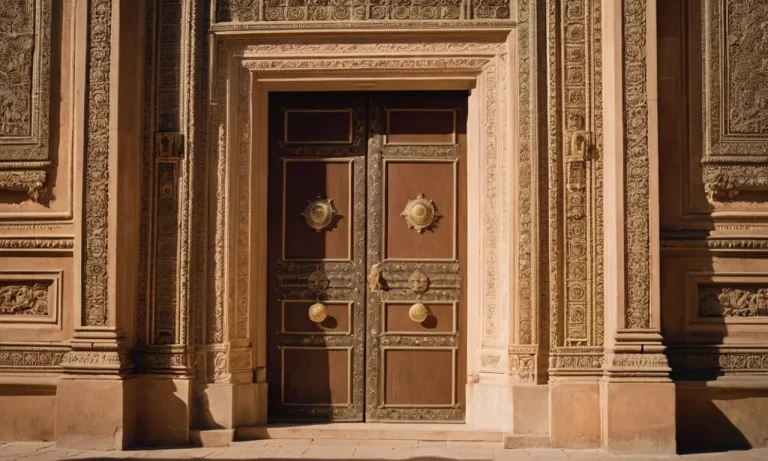Why Doesn’T God Save Everyone?
If you have ever wondered why God allows suffering in the world or why He doesn’t save everyone, you’re not alone. Many people grapple with this difficult theological question.
If you’re short on time, here’s a quick answer: God desires everyone to be saved, but has given us free will. Sadly, some people use that free will to turn away from God.
In this comprehensive article, we will dive deep into several reasons why God doesn’t forcibly save everyone, including factors like human free will, the problem of evil, God’s mysterious will, spiritual warfare, and more.
God Genuinely Desires All People To Be Saved
Biblical Support That God Wants All To Be Saved
The Bible makes it clear in several passages that God desires all people to be saved and come to knowledge of the truth. For example:
- “The Lord is not slow about His promise, as some count slowness, but is patient toward you, not wishing for any to perish but for all to come to repentance” (2 Peter 3:9).
- “God our Savior, who desires all men to be saved and to come to the knowledge of the truth” (1 Timothy 2:3-4).
These verses demonstrate God’s universal love and desire for everyone to accept His offer of salvation through faith in Jesus Christ. Though God could force everyone to believe in Him, He has chosen to give humans free will to make their own choice.
God’s Love and Mercy Extend To All People
God does not just love some people, He loves the entire world! John 3:16 famously declares, “For God so loved the world that He gave His only begotten Son, that whoever believes in Him shall not perish but have eternal life.”
His mercy and grace are freely available to both Jews and Gentiles (Romans 11:32). According to GotQuestions.org, “God’s offer of salvation and life is extended to every man, woman, boy, and girl on the planet.” Truly, “The Lord is good to all, and His mercy is over all His works” (Psalms 145:9).
So Why Doesn’t God Forcibly Save Everyone?
This question has challenged theologians and philosophers for centuries. In one sense, God does desire for all people to repent and accept eternal life through Jesus. Yet in His sovereignty, God allows humans the freedom to accept or reject Him.
As explained on Focus on the Family:
God could bring all people to Himself against their will, but that would mean eliminating human freedom. True love doesn’t compel; it liberates. So instead of forcing His creatures to bend, God set into motion a plan to woo us.
In the end, God wants a loving relationship with His people built upon mutual trust and respect, not control or compulsion. He will never override a person’s freedom to make their own life decisions, even at the risk of that person rejecting Him.
Though God promises salvation is available to all (John 6:37), tragically some will still refuse His great love and gift of grace.
Humanity’s God-Given Free Will
Definition and Biblical Basis For Free Will
The Bible teaches that God created humans with the ability to make meaningful choices, commonly referred to as “free will.” This is evident in various scriptures, such as when Adam and Eve exercised their free will to eat the forbidden fruit (Genesis 3:6).
God also appeals to Israel to “choose life…by loving the Lord your God” (Deuteronomy 30:19-20), indicating they had the free will to love and obey God or not. Jesus’ statement “whoever believes in me…” (John 3:16) also implies that humans can choose to either believe or reject him.
Allowing free will was an act of love by God to enable meaningful relationships. Forced or robotic devotion is not true love. God highly values genuine, heartfelt devotion which can only come through free choice (Deuteronomy 6:5).
Allowing Free Will Necessitates The Possibility of Evil
With free will comes the possibility of sin and evil. If humans can make choices, that means they can also make harmful, sinful choices. According to the Bible, suffering and death entered the world as a consequence of Adam and Eve’s original sin of disobedience (Genesis 3:16-19).
If God had not allowed free will, then Adam and Eve would essentially have been robots without the capacity for a real relationship with God. They would also have been incapable of truly loving each other. The tragedy of evil springs from the glory of humans having been given moral free will.
God certainly could have created a world without the possibility of sin and evil by not granting free will. But that world would have lacked the higher goods made possible by free will, such as genuine love, moral virtues like courage and self-sacrifice, meaningful accomplishment, and so on.
Most theologians argue allowing free will to enable these higher goods is consistent with God being all loving, powerful and morally perfect.
God Values Authentic Faith and Relationship
Granting free will means allowing the possibility of evil and suffering, including unjust suffering. Yet Scripture affirms that God is actively opposed to evil (Psalm 34:16; Isaiah 5:20) and uses suffering to bring about redemptive purposes for those who love him (Romans 8:28).
He also promises that in the future creation there will no longer be suffering or death (Revelation 21:4). For now, God tolerates evil and suffering because he values authentic relationship and faith so highly.
God could compel all people toward good and force everyone into obedience. However, the Bible describes that as contrary to God’s nature of love. Instead, God patiently gives humans space to either reject or willingly embrace him and his moral vision for life – trusting that ultimately love wins (1 Corinthians 13:8).
The words of Jesus provide assurance that despite ongoing evil and suffering in the present, in eternity God “will wipe every tear from their eyes” (Revelation 21:4).
The Complex Problem of Evil and Suffering
The existence of evil and suffering poses a perplexing theological problem. If God is all-powerful, all-knowing, and perfectly good, why would He allow evil and suffering to exist at all? There are a few perspectives that seek to make sense of this apparent paradox.
Why Does God Allow Evil At All?
According to Christian beliefs, evil was not part of God’s original design for the world. Evil entered through the disobedience and rebellion of created beings with moral agency, i.e. free will to make choices.
So one explanation is that allowing free choice, despite its potential for evil and suffering, enables the potential for goodness, creativity, relationships, and love.
Another view is that God uses suffering to bring about spiritual growth and greater reliance on Him. Suffering challenges us to evaluate our priorities and turn to God for comfort and meaning. As C.S Lewis wrote, “God whispers to us in our pleasures, speaks in our conscience, but shouts in our pains: it is His megaphone to rouse a deaf world.”
Different Kinds of Evil and Suffering
Philosophers typically categorize evil and suffering as either natural evil (caused by diseases, natural disasters, etc.) or moral evil (caused by human intent or negligence). Epicurus’ logical problem of evil argues the existence of evil seems incompatible with an all-powerful and good God.
The probabilistic problem of evil contends that the amount and types of suffering we see are highly unlikely if an omnipotent, omniscient, perfectly good God exists. Solutions to these arguments involve complex reasoning about possibilities regarding necessity, free will, unknown greater goods, soul-making virtues developed through overcoming adversity, and other weighty theological ideas.
Despite Evil, God Can Redeem Suffering For Good
While not minimizing the reality of evil and suffering, the Bible teaches God is capable of redeeming painful situations by using them to bring about positive outcomes, often unforeseeable at the time. For example:
- Persecution caused early Christians to scatter abroad and spread the gospel more widely (Acts 8:1-4)
- A paralyzed man’s disability gave occasion for Jesus to display His healing power and authority (Mark 2:1-12)
- The betrayal and murder of Jesus led to spiritual salvation being offered to the entire world (Luke 23; Acts 2)
In the end, Christians believe God will eliminate all suffering, injustice, evil and death in connection with Jesus’ second coming to establish a newly restored creation (Revelation 21:1-5). Until then, God suffers along with those who suffer and promises to redeem hardship for good.
God’s Mysterious and Hidden Will
God’s will can seem mysterious to us at times. There are aspects of His will that He has chosen to reveal, yet other elements that remain hidden for now. Approaching this issue with humility allows us to trust God even when we lack full understanding.
Aspects of God’s Will Revealed vs. Hidden
There are definitive things that Scripture tells us are within God’s revealed will – such as desiring all people to repent and turn to Him, and sending Jesus to provide redemption (2 Peter 3:9, John 3:16).
Yet when it comes to specifics about the future or certain life circumstances, God’s precise will often remains veiled from our view.
For example, while we know it is God’s heart for all to be healed from infirmities, we do not always understand why certain people receive miraculous healing in this life while others continue to suffer with illness.
God may choose to keep some aspects of His will mysterious to us for reasons we cannot fully grasp.
Humility In What We Cannot Fully Understand
Rather than demanding answers from God about hidden things, humility acknowledges the limits of our human perspective. As Isaiah 55:8-9 (NIV) says, “For my thoughts are not your thoughts, neither are your ways my ways, declares the Lord.
For as the heavens are higher than the earth, so are my ways higher than your ways and my thoughts than your thoughts.
“Though God’s ways surpass our ability to fully comprehend them, we can still trust His heart of love based on what He has revealed of Himself through Christ. As 1 Corinthians 13:12 (NIV) says, “For now we see only a reflection as in a mirror; then we shall see face to face.
Now I know in part; then I shall know fully, even as I am fully known.” One day we will understand God’s mysterious ways in greater fullness.
Trusting God’s Goodness Despite Unanswered Questions
When confronted with unanswered questions and areas where God’s will remains hidden, we have a choice. Will we doubt God’s goodness and wise plan, or continue to place our trust in Him? Job’s example can inspire us to persevere in faith.
After losing everything, Job questioned God yet did not ultimately despair. He said, “Though he slay me, I will hope in him” (Job 13:15 NIV). And God affirmed that Job had spoken rightly about Him despite not having full understanding (Job 42:7-8).
We too can cling to faith in God’s trustworthy character when we lack clear answers.
Rather than demanding God conform to our limited human logic, humility submits to His higher wisdom and timing to reveal more in due time. By God’s grace, we can say with Job, “My ears had heard of you but now my eyes have seen you” (Job 42:5 NIV).
God continues gradually opening our eyes to greater understanding as we walk with Him.
Behind-the-Scenes Spiritual Warfare
Biblical Evidence for Spiritual Warfare
The Bible references spiritual warfare in several passages. Ephesians 6:12 states, “For our struggle is not against flesh and blood, but against the rulers, against the authorities, against the powers of this dark world and against the spiritual forces of evil in the heavenly realms.”
This verse makes it clear that there is an unseen battle going on between God’s forces and evil spiritual forces.
In the Old Testament, the book of Daniel references spiritual warfare when Daniel prays and fasts for 21 days but is opposed by spiritual forces until the archangel Michael comes to help (Daniel 10:12-14).
And in the New Testament, Jesus casts out demons on several occasions, demonstrating power and authority over evil spirits that possess and oppress people (Mark 1:21-28, for example).
The Fall and Curse Due to Sin
Spiritual warfare originated when Satan and demons rebelled against God. Revelation 12:7-9 describes a primeval battle in heaven when Satan tried to overthrow God, but Satan was defeated and cast down to earth.
Then Satan tempted Adam and Eve, and through their sin, decay and death entered the world (Genesis 3:1-7; Romans 5:12).
All the pain, suffering and tragedy we see today is part of the ongoing consequences of sin and spiritual warfare that began back in Genesis. God did not originally create the world with cancer, tornadoes or tragic accidents – those things entered because of humankind’s rebellion and the powers of darkness that fight against God’s purposes in the world.
God Will Ultimately Defeat Evil Completely
Although evil spirits engineer much pain and tragedy now, the Bible promises that God will defeat Satan once and for all. Passages like Revelation 19-20 describe Jesus’ ultimate victory over Satan’s rebellion. And Romans 16:20 says, “The God of peace will soon crush Satan under your feet.”
Statistics indicate that over 60% of young adults who grew up Christian abandon their faith after high school. One major reason is unanswered questions about why God allows evil and tragic suffering if He is all-good and all-powerful.
But ultimately, the existence of suffering does not disprove God’s goodness and power; rather, human free will and ongoing spiritual warfare help explain the situation. In the end, God promises to fully restore justice, overthrow evil, and wipe away every tear (Revelation 21:4).
Conclusion
In closing, while we may never fully understand in this life why God doesn’t save everyone right now, we can trust His goodness and love for all people. This article explored how God genuinely desires everyone to be saved while still allowing human free will, different kinds of evil and suffering, aspects of God’s hidden will, and the behind-the-scenes spiritual warfare resulting from sin and evil.
Despite our unanswered questions, God has provided salvation to anyone who believes in His Son Jesus. He will also one day fully redeem all suffering, restore justice and make all things right. What we can do now is come to God ourselves in faith, share His love with others, and rest in the hope of eternal life with Him.








